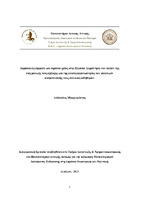| dc.contributor.advisor | Vavouras, Ioannis | |
| dc.contributor.author | Μακρυκώστας, Απόστολός | |
| dc.date.accessioned | 2023-06-30T08:29:51Z | |
| dc.date.available | 2023-06-30T08:29:51Z | |
| dc.date.issued | 2023-06-15 | |
| dc.identifier.uri | https://polynoe.lib.uniwa.gr/xmlui/handle/11400/4562 | |
| dc.identifier.uri | http://dx.doi.org/10.26265/polynoe-4400 | |
| dc.description.abstract | Στην διπλωματική εργασία, αυτή γίνεται μια προσπάθεια καταγραφής της Δημοσιονομικής κατάστασης της χώρας, και των προβλημάτων που παρουσιάστηκαν για μια περίοδο 20 χρόνων. Παράλληλα, παρουσιάζεται η διαχρονική εξέλιξη του δημόσιου χρέους, ως απόρροια των δημοσιονομικών ελλειμμάτων και των πολιτικών που εφαρμόστηκαν. Η διπλωματική εργασία ουσιαστικά χωρίζετε σε τέσσερα μέρη, όπου στο αρχικό (κεφ. 1) παρουσιάζεται η δημοσιονομική κατάσταση της χώρας συνοδευόμενη με εννοιολογικούς ορισμούς. Στην συνέχεια, (κεφ. 2) παρουσιάζεται η εξέλιξη του δημόσιου χρέους, καθώς και οι λόγοι για τους οποίους η Ελλάδα οδηγήθηκε τρεις φορές στην υπογραφή ισάριθμων προγραμμάτων διάσωσης, τα οποία αντιστοιχούσαν σε πάνω από 210 δις ευρώ. Στο τρίτο μέρος (κεφ. 3, 4), αναπτύσσεται ερωτηματολόγιο σε δείγμα 150 ερωτηθέντων, το οποίο
σχεδιάστηκε για να αποτυπώσει την κατανόηση των δημοσίων ελλειμμάτων και του δημόσιου χρέους στην Ελλάδα, τους αντιληπτούς λόγους ανάπτυξής τους, την αποτελεσματικότητα των πολιτικών που ακολουθούνται για την αντιμετώπισή τους.
Τέλος, στο τελευταίο μέρος (κεφ. 5) της διπλωματικής εργασίας, παρουσιάζονται μια σειρά προτάσεων προκειμένου η χωρά να μπορεί να αντιμετωπίσει τις παθογένειες του παρελθόντος και να μπορεί να εισέλθει σε αναπτυξιακή τροχιά. | el |
| dc.format.extent | 122 | el |
| dc.language.iso | el | el |
| dc.publisher | Πανεπιστήμιο Δυτικής Αττικής | el |
| dc.rights | Αναφορά Δημιουργού - Μη Εμπορική Χρήση - Παρόμοια Διανομή 4.0 Διεθνές | * |
| dc.rights | Attribution-NonCommercial-NoDerivatives 4.0 Διεθνές | * |
| dc.rights.uri | http://creativecommons.org/licenses/by-nc-nd/4.0/ | * |
| dc.subject | Δημόσια ελλείμματα | el |
| dc.subject | Δημόσιο χρέος | el |
| dc.subject | Συνθήκη του Μάαστριχτ | el |
| dc.subject | Δημοσιονομικό έλλειμμα | el |
| dc.subject | Δημοσιονομική πολιτική | el |
| dc.subject | Σύμφωνο Σταθερότητας και Ανάπτυξης | el |
| dc.title | Δημόσια ελλείμματα και δημόσιο χρέος στην Ελλάδα: Διερεύνηση των αιτιών της διαχρονικής τους εξέλιξης και της αποτελεσματικότητας των πολιτικών αντιμετώπισής τους που ακολουθήθηκαν | el |
| dc.title.alternative | Public deficits and public debt in Greece: Investigation of the causes of their evolution over time and the effectiveness of the policies followed to deal with them | el |
| dc.type | Μεταπτυχιακή διπλωματική εργασία | el |
| dc.contributor.committee | Βαβούρα, Χαρίκλεια | |
| dc.contributor.committee | Δεδούλη, Αικατερίνη | |
| dc.contributor.committee | Στρόμπλος, Νικόλαος | |
| dc.contributor.faculty | Σχολή Διοικητικών, Οικονομικών & Κοινωνικών Επιστημών | el |
| dc.contributor.department | Τμήμα Λογιστικής και Χρηματοοικονομικής | el |
| dc.contributor.master | Δημόσια Οικονομική και Πολιτική | el |
| dc.description.abstracttranslated | In this Master thesis, an attempt is made to record the country's fiscal situation and the problems that appeared for a period of 20 years. At the same time, the evolution of the public debt over time is presented as a consequence of the fiscal deficits and the
implemented policies. The Master thesis is essentially divided into four parts, where in the first part (chapter 1), the country's fiscal situation is presented, accompanied by conceptual definitions. Subsequently, (chapter 2), the evolution of the public debt is presented as well as the reasons for which Greece was led three times to sign equal number of bailout programs corresponding to over 210 billion euros. In the third part (chapters 3, 4), a questionnaire is developed on a sample of 150 respondents, which was designed to capture the understanding of public deficits and public debt in Greece, the perceived reasons for their development and the effectiveness of the policies followed to deal with them. Finally, in the last part (chapter 5) of the Master thesis, a series of proposals are presented so as the country to be able to deal with the pathologies of the past and manage to enter in a
development trajectory. | el |


